Literature Analysis: Exploring Key Literary Quotes
VerifiedAdded on 2023/01/16
|8
|2156
|33
Homework Assignment
AI Summary
This homework assignment analyzes selected quotes from three literary works: William Blake's "London," Alexander Pushkin's "The Queen of Spades," and Leo Tolstoy's "The Death of Ivan Ilyich." The student provides interpretations of each quote's significance, exploring themes of social injustice, obsession, and the human condition. The analysis of Blake's poem focuses on child labor and exploitation in industrial London, while the Pushkin excerpt highlights the character Hermann's obsession with gambling and wealth. Tolstoy's quotes delve into the themes of death and the meaning of life. Additionally, the assignment includes a broader discussion on the themes of the texts, such as the role of imagination, the triviality of life, and the acceptance of death. The student references the literary analysis and provides supporting evidence from the texts.

Running head: LITERATURE : QUESTIONS AND ANSWERS
LITERATURE: QUESTIONS AND ANSWERS
Name of the student
Name of the University
Author Note
LITERATURE: QUESTIONS AND ANSWERS
Name of the student
Name of the University
Author Note
Paraphrase This Document
Need a fresh take? Get an instant paraphrase of this document with our AI Paraphraser
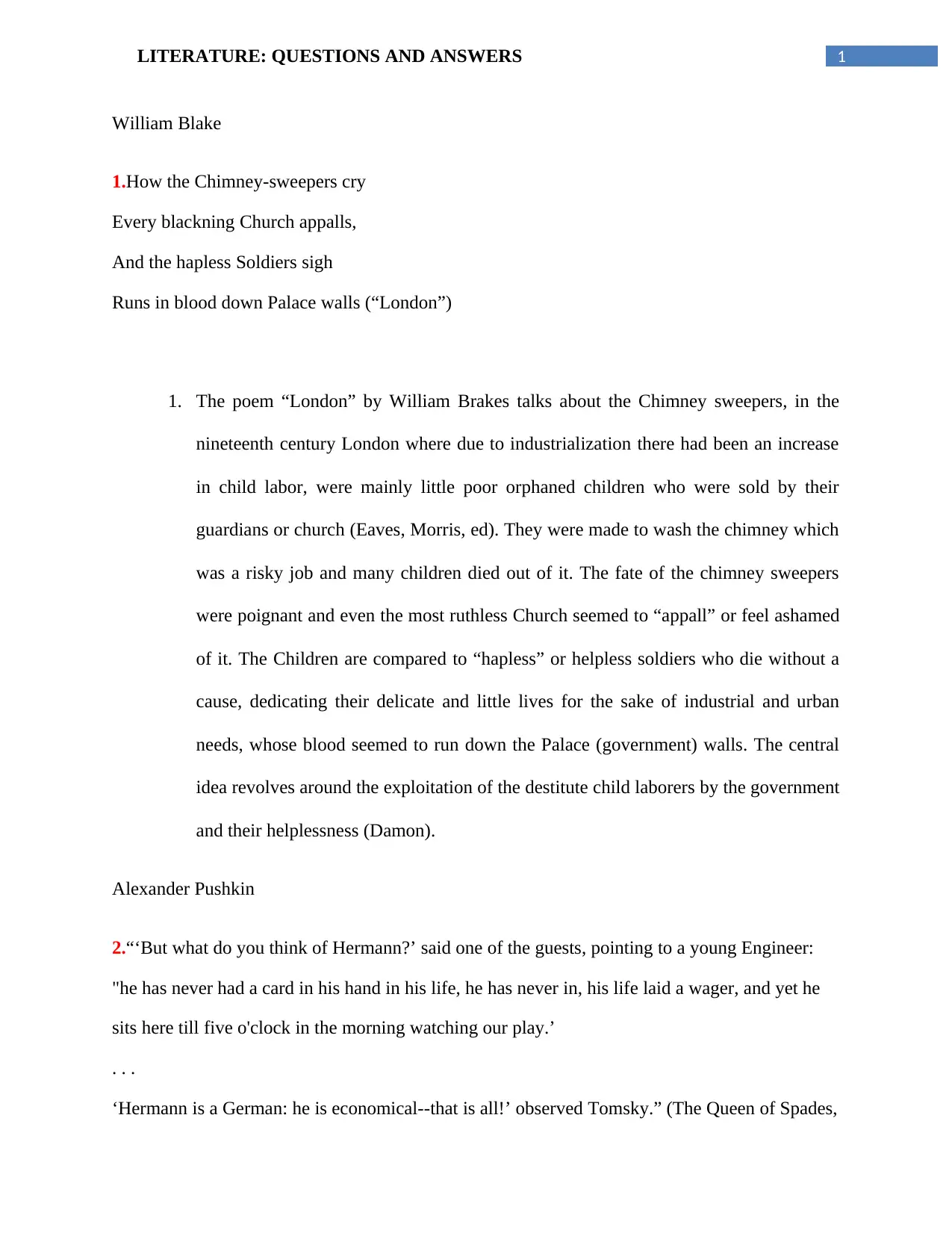
1LITERATURE: QUESTIONS AND ANSWERS
William Blake
1.How the Chimney-sweepers cry
Every blackning Church appalls,
And the hapless Soldiers sigh
Runs in blood down Palace walls (“London”)
1. The poem “London” by William Brakes talks about the Chimney sweepers, in the
nineteenth century London where due to industrialization there had been an increase
in child labor, were mainly little poor orphaned children who were sold by their
guardians or church (Eaves, Morris, ed). They were made to wash the chimney which
was a risky job and many children died out of it. The fate of the chimney sweepers
were poignant and even the most ruthless Church seemed to “appall” or feel ashamed
of it. The Children are compared to “hapless” or helpless soldiers who die without a
cause, dedicating their delicate and little lives for the sake of industrial and urban
needs, whose blood seemed to run down the Palace (government) walls. The central
idea revolves around the exploitation of the destitute child laborers by the government
and their helplessness (Damon).
Alexander Pushkin
2.“‘But what do you think of Hermann?’ said one of the guests, pointing to a young Engineer:
"he has never had a card in his hand in his life, he has never in, his life laid a wager, and yet he
sits here till five o'clock in the morning watching our play.’
. . .
‘Hermann is a German: he is economical--that is all!’ observed Tomsky.” (The Queen of Spades,
William Blake
1.How the Chimney-sweepers cry
Every blackning Church appalls,
And the hapless Soldiers sigh
Runs in blood down Palace walls (“London”)
1. The poem “London” by William Brakes talks about the Chimney sweepers, in the
nineteenth century London where due to industrialization there had been an increase
in child labor, were mainly little poor orphaned children who were sold by their
guardians or church (Eaves, Morris, ed). They were made to wash the chimney which
was a risky job and many children died out of it. The fate of the chimney sweepers
were poignant and even the most ruthless Church seemed to “appall” or feel ashamed
of it. The Children are compared to “hapless” or helpless soldiers who die without a
cause, dedicating their delicate and little lives for the sake of industrial and urban
needs, whose blood seemed to run down the Palace (government) walls. The central
idea revolves around the exploitation of the destitute child laborers by the government
and their helplessness (Damon).
Alexander Pushkin
2.“‘But what do you think of Hermann?’ said one of the guests, pointing to a young Engineer:
"he has never had a card in his hand in his life, he has never in, his life laid a wager, and yet he
sits here till five o'clock in the morning watching our play.’
. . .
‘Hermann is a German: he is economical--that is all!’ observed Tomsky.” (The Queen of Spades,
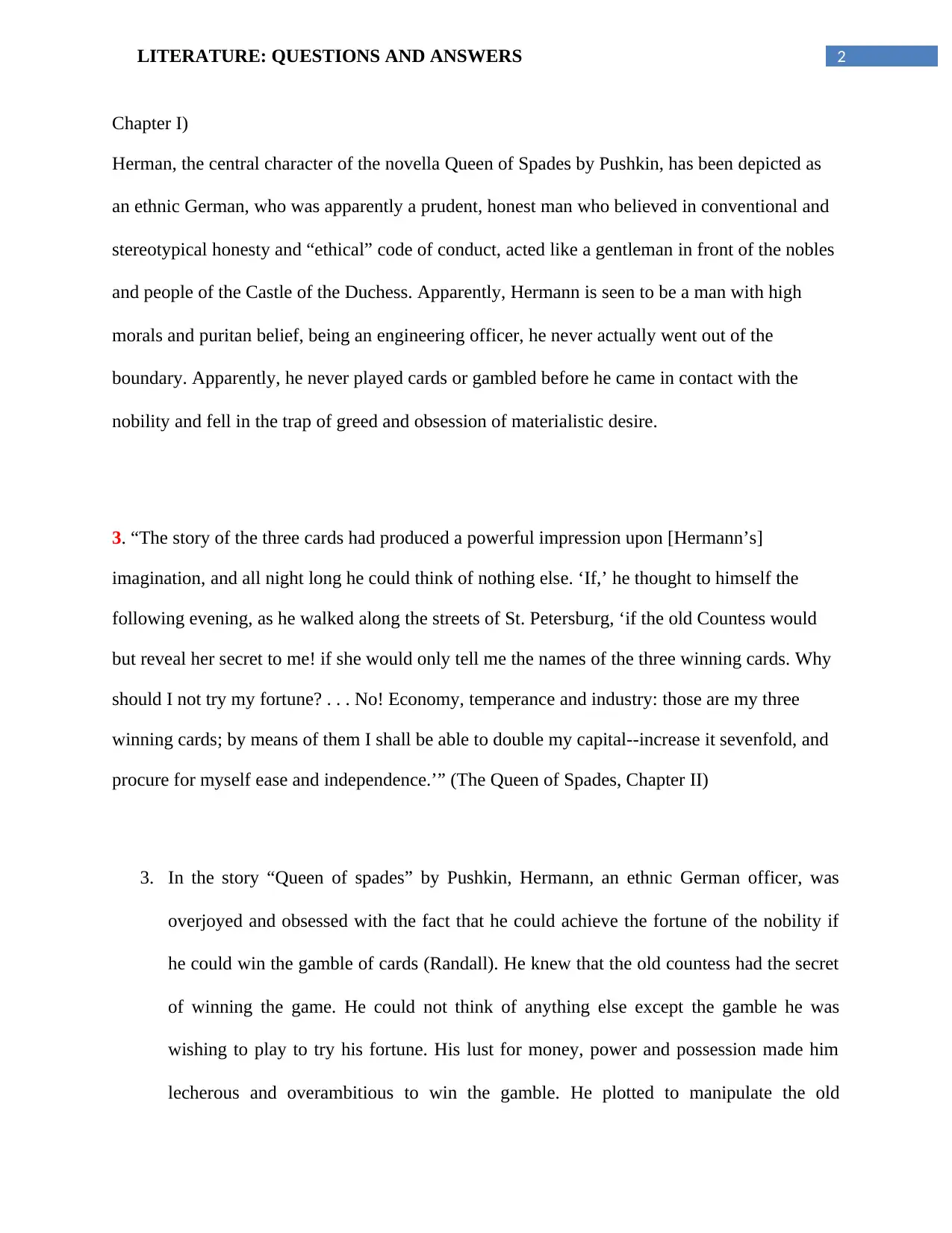
2LITERATURE: QUESTIONS AND ANSWERS
Chapter I)
Herman, the central character of the novella Queen of Spades by Pushkin, has been depicted as
an ethnic German, who was apparently a prudent, honest man who believed in conventional and
stereotypical honesty and “ethical” code of conduct, acted like a gentleman in front of the nobles
and people of the Castle of the Duchess. Apparently, Hermann is seen to be a man with high
morals and puritan belief, being an engineering officer, he never actually went out of the
boundary. Apparently, he never played cards or gambled before he came in contact with the
nobility and fell in the trap of greed and obsession of materialistic desire.
3. “The story of the three cards had produced a powerful impression upon [Hermann’s]
imagination, and all night long he could think of nothing else. ‘If,’ he thought to himself the
following evening, as he walked along the streets of St. Petersburg, ‘if the old Countess would
but reveal her secret to me! if she would only tell me the names of the three winning cards. Why
should I not try my fortune? . . . No! Economy, temperance and industry: those are my three
winning cards; by means of them I shall be able to double my capital--increase it sevenfold, and
procure for myself ease and independence.’” (The Queen of Spades, Chapter II)
3. In the story “Queen of spades” by Pushkin, Hermann, an ethnic German officer, was
overjoyed and obsessed with the fact that he could achieve the fortune of the nobility if
he could win the gamble of cards (Randall). He knew that the old countess had the secret
of winning the game. He could not think of anything else except the gamble he was
wishing to play to try his fortune. His lust for money, power and possession made him
lecherous and overambitious to win the gamble. He plotted to manipulate the old
Chapter I)
Herman, the central character of the novella Queen of Spades by Pushkin, has been depicted as
an ethnic German, who was apparently a prudent, honest man who believed in conventional and
stereotypical honesty and “ethical” code of conduct, acted like a gentleman in front of the nobles
and people of the Castle of the Duchess. Apparently, Hermann is seen to be a man with high
morals and puritan belief, being an engineering officer, he never actually went out of the
boundary. Apparently, he never played cards or gambled before he came in contact with the
nobility and fell in the trap of greed and obsession of materialistic desire.
3. “The story of the three cards had produced a powerful impression upon [Hermann’s]
imagination, and all night long he could think of nothing else. ‘If,’ he thought to himself the
following evening, as he walked along the streets of St. Petersburg, ‘if the old Countess would
but reveal her secret to me! if she would only tell me the names of the three winning cards. Why
should I not try my fortune? . . . No! Economy, temperance and industry: those are my three
winning cards; by means of them I shall be able to double my capital--increase it sevenfold, and
procure for myself ease and independence.’” (The Queen of Spades, Chapter II)
3. In the story “Queen of spades” by Pushkin, Hermann, an ethnic German officer, was
overjoyed and obsessed with the fact that he could achieve the fortune of the nobility if
he could win the gamble of cards (Randall). He knew that the old countess had the secret
of winning the game. He could not think of anything else except the gamble he was
wishing to play to try his fortune. His lust for money, power and possession made him
lecherous and overambitious to win the gamble. He plotted to manipulate the old
⊘ This is a preview!⊘
Do you want full access?
Subscribe today to unlock all pages.

Trusted by 1+ million students worldwide
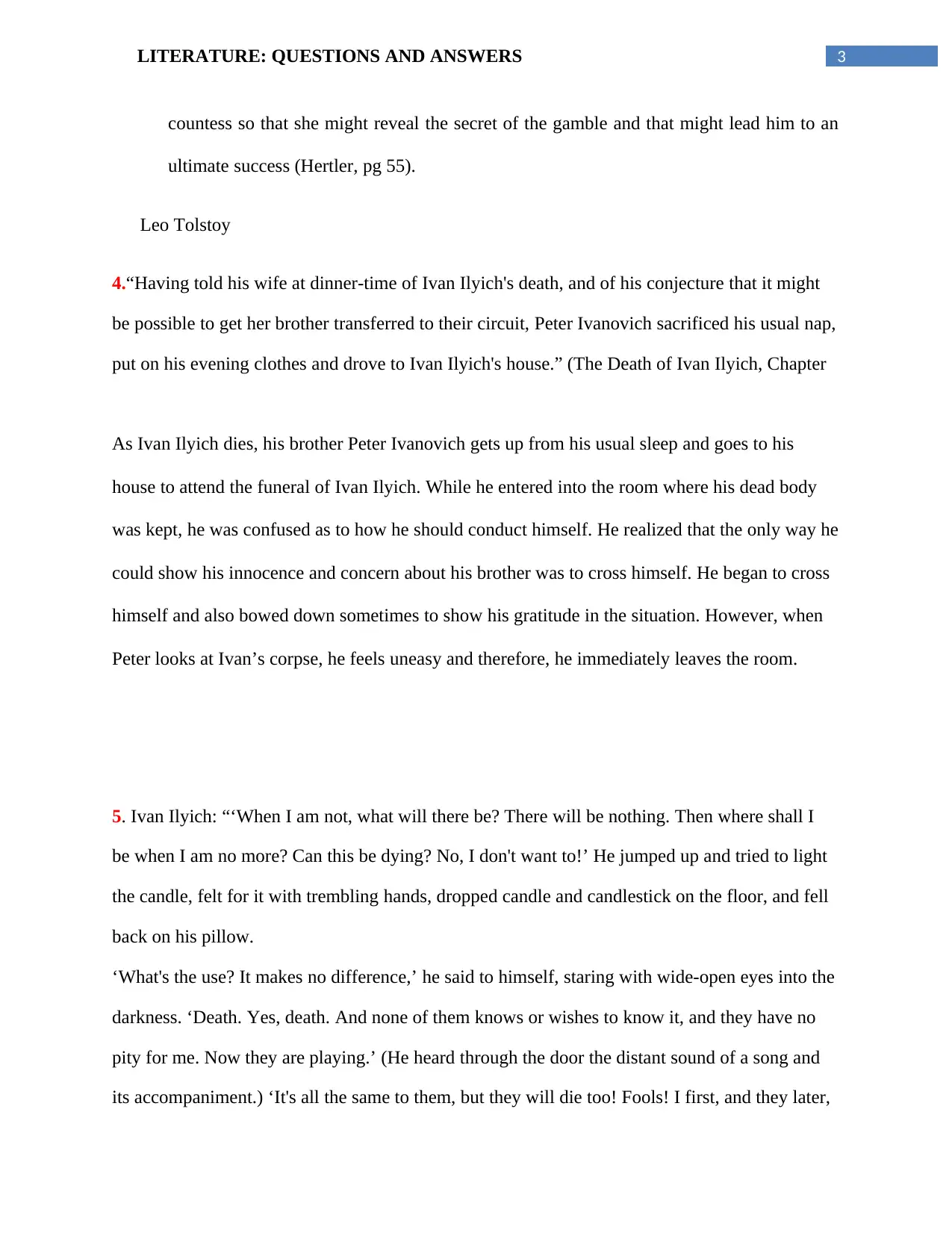
3LITERATURE: QUESTIONS AND ANSWERS
countess so that she might reveal the secret of the gamble and that might lead him to an
ultimate success (Hertler, pg 55).
Leo Tolstoy
4.“Having told his wife at dinner-time of Ivan Ilyich's death, and of his conjecture that it might
be possible to get her brother transferred to their circuit, Peter Ivanovich sacrificed his usual nap,
put on his evening clothes and drove to Ivan Ilyich's house.” (The Death of Ivan Ilyich, Chapter
As Ivan Ilyich dies, his brother Peter Ivanovich gets up from his usual sleep and goes to his
house to attend the funeral of Ivan Ilyich. While he entered into the room where his dead body
was kept, he was confused as to how he should conduct himself. He realized that the only way he
could show his innocence and concern about his brother was to cross himself. He began to cross
himself and also bowed down sometimes to show his gratitude in the situation. However, when
Peter looks at Ivan’s corpse, he feels uneasy and therefore, he immediately leaves the room.
5. Ivan Ilyich: “‘When I am not, what will there be? There will be nothing. Then where shall I
be when I am no more? Can this be dying? No, I don't want to!’ He jumped up and tried to light
the candle, felt for it with trembling hands, dropped candle and candlestick on the floor, and fell
back on his pillow.
‘What's the use? It makes no difference,’ he said to himself, staring with wide-open eyes into the
darkness. ‘Death. Yes, death. And none of them knows or wishes to know it, and they have no
pity for me. Now they are playing.’ (He heard through the door the distant sound of a song and
its accompaniment.) ‘It's all the same to them, but they will die too! Fools! I first, and they later,
countess so that she might reveal the secret of the gamble and that might lead him to an
ultimate success (Hertler, pg 55).
Leo Tolstoy
4.“Having told his wife at dinner-time of Ivan Ilyich's death, and of his conjecture that it might
be possible to get her brother transferred to their circuit, Peter Ivanovich sacrificed his usual nap,
put on his evening clothes and drove to Ivan Ilyich's house.” (The Death of Ivan Ilyich, Chapter
As Ivan Ilyich dies, his brother Peter Ivanovich gets up from his usual sleep and goes to his
house to attend the funeral of Ivan Ilyich. While he entered into the room where his dead body
was kept, he was confused as to how he should conduct himself. He realized that the only way he
could show his innocence and concern about his brother was to cross himself. He began to cross
himself and also bowed down sometimes to show his gratitude in the situation. However, when
Peter looks at Ivan’s corpse, he feels uneasy and therefore, he immediately leaves the room.
5. Ivan Ilyich: “‘When I am not, what will there be? There will be nothing. Then where shall I
be when I am no more? Can this be dying? No, I don't want to!’ He jumped up and tried to light
the candle, felt for it with trembling hands, dropped candle and candlestick on the floor, and fell
back on his pillow.
‘What's the use? It makes no difference,’ he said to himself, staring with wide-open eyes into the
darkness. ‘Death. Yes, death. And none of them knows or wishes to know it, and they have no
pity for me. Now they are playing.’ (He heard through the door the distant sound of a song and
its accompaniment.) ‘It's all the same to them, but they will die too! Fools! I first, and they later,
Paraphrase This Document
Need a fresh take? Get an instant paraphrase of this document with our AI Paraphraser
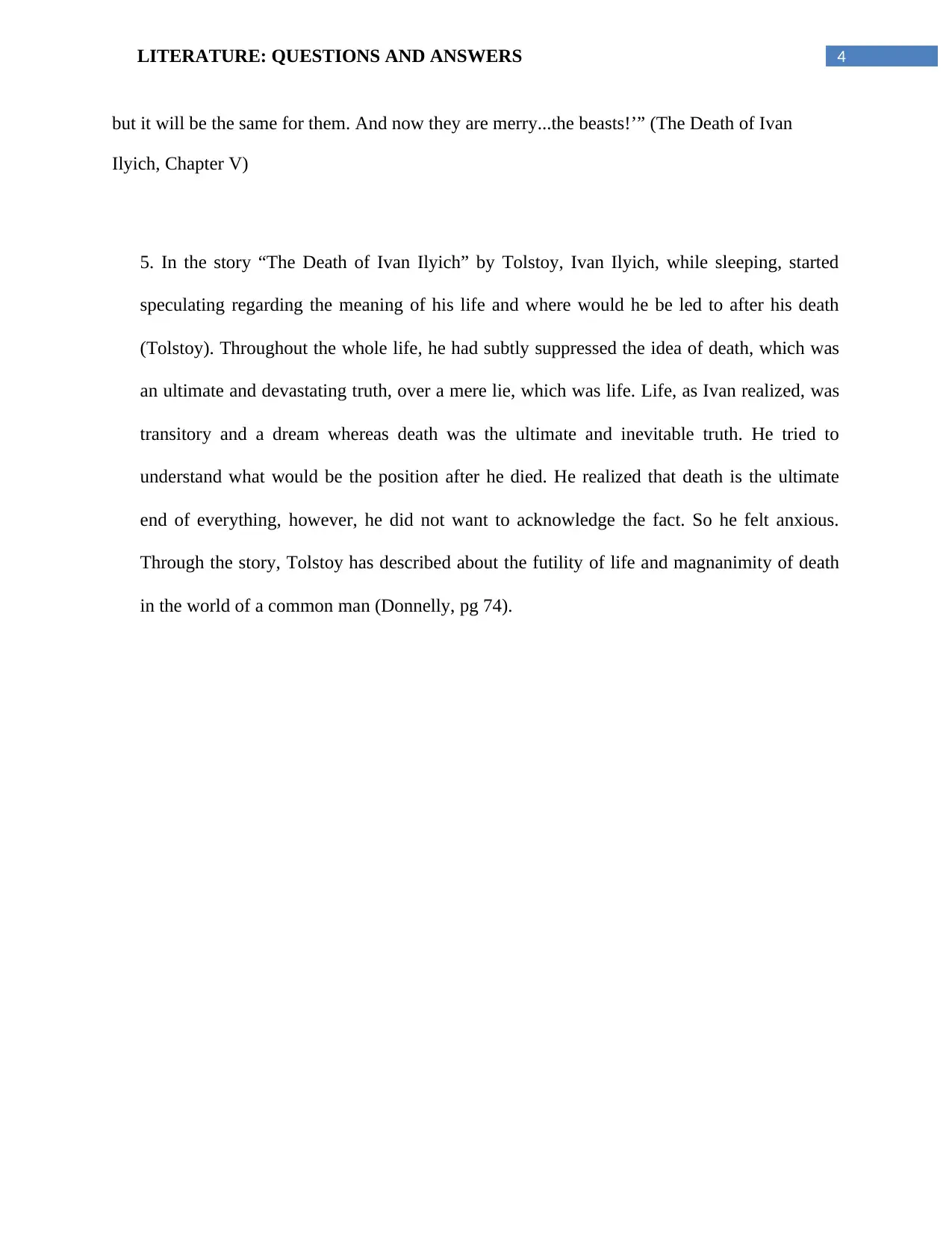
4LITERATURE: QUESTIONS AND ANSWERS
but it will be the same for them. And now they are merry...the beasts!’” (The Death of Ivan
Ilyich, Chapter V)
5. In the story “The Death of Ivan Ilyich” by Tolstoy, Ivan Ilyich, while sleeping, started
speculating regarding the meaning of his life and where would he be led to after his death
(Tolstoy). Throughout the whole life, he had subtly suppressed the idea of death, which was
an ultimate and devastating truth, over a mere lie, which was life. Life, as Ivan realized, was
transitory and a dream whereas death was the ultimate and inevitable truth. He tried to
understand what would be the position after he died. He realized that death is the ultimate
end of everything, however, he did not want to acknowledge the fact. So he felt anxious.
Through the story, Tolstoy has described about the futility of life and magnanimity of death
in the world of a common man (Donnelly, pg 74).
but it will be the same for them. And now they are merry...the beasts!’” (The Death of Ivan
Ilyich, Chapter V)
5. In the story “The Death of Ivan Ilyich” by Tolstoy, Ivan Ilyich, while sleeping, started
speculating regarding the meaning of his life and where would he be led to after his death
(Tolstoy). Throughout the whole life, he had subtly suppressed the idea of death, which was
an ultimate and devastating truth, over a mere lie, which was life. Life, as Ivan realized, was
transitory and a dream whereas death was the ultimate and inevitable truth. He tried to
understand what would be the position after he died. He realized that death is the ultimate
end of everything, however, he did not want to acknowledge the fact. So he felt anxious.
Through the story, Tolstoy has described about the futility of life and magnanimity of death
in the world of a common man (Donnelly, pg 74).
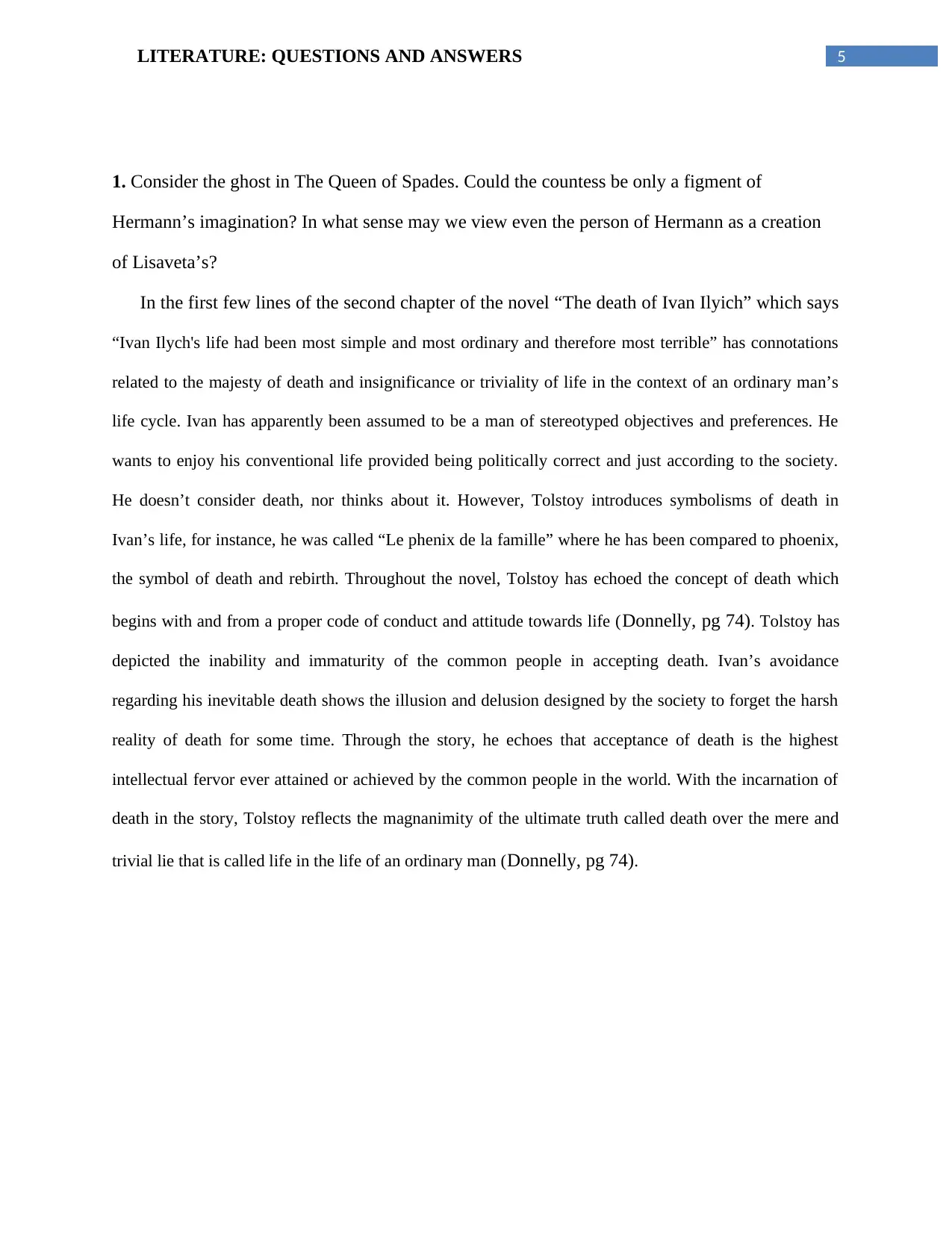
5LITERATURE: QUESTIONS AND ANSWERS
1. Consider the ghost in The Queen of Spades. Could the countess be only a figment of
Hermann’s imagination? In what sense may we view even the person of Hermann as a creation
of Lisaveta’s?
In the first few lines of the second chapter of the novel “The death of Ivan Ilyich” which says
“Ivan Ilych's life had been most simple and most ordinary and therefore most terrible” has connotations
related to the majesty of death and insignificance or triviality of life in the context of an ordinary man’s
life cycle. Ivan has apparently been assumed to be a man of stereotyped objectives and preferences. He
wants to enjoy his conventional life provided being politically correct and just according to the society.
He doesn’t consider death, nor thinks about it. However, Tolstoy introduces symbolisms of death in
Ivan’s life, for instance, he was called “Le phenix de la famille” where he has been compared to phoenix,
the symbol of death and rebirth. Throughout the novel, Tolstoy has echoed the concept of death which
begins with and from a proper code of conduct and attitude towards life (Donnelly, pg 74). Tolstoy has
depicted the inability and immaturity of the common people in accepting death. Ivan’s avoidance
regarding his inevitable death shows the illusion and delusion designed by the society to forget the harsh
reality of death for some time. Through the story, he echoes that acceptance of death is the highest
intellectual fervor ever attained or achieved by the common people in the world. With the incarnation of
death in the story, Tolstoy reflects the magnanimity of the ultimate truth called death over the mere and
trivial lie that is called life in the life of an ordinary man (Donnelly, pg 74).
1. Consider the ghost in The Queen of Spades. Could the countess be only a figment of
Hermann’s imagination? In what sense may we view even the person of Hermann as a creation
of Lisaveta’s?
In the first few lines of the second chapter of the novel “The death of Ivan Ilyich” which says
“Ivan Ilych's life had been most simple and most ordinary and therefore most terrible” has connotations
related to the majesty of death and insignificance or triviality of life in the context of an ordinary man’s
life cycle. Ivan has apparently been assumed to be a man of stereotyped objectives and preferences. He
wants to enjoy his conventional life provided being politically correct and just according to the society.
He doesn’t consider death, nor thinks about it. However, Tolstoy introduces symbolisms of death in
Ivan’s life, for instance, he was called “Le phenix de la famille” where he has been compared to phoenix,
the symbol of death and rebirth. Throughout the novel, Tolstoy has echoed the concept of death which
begins with and from a proper code of conduct and attitude towards life (Donnelly, pg 74). Tolstoy has
depicted the inability and immaturity of the common people in accepting death. Ivan’s avoidance
regarding his inevitable death shows the illusion and delusion designed by the society to forget the harsh
reality of death for some time. Through the story, he echoes that acceptance of death is the highest
intellectual fervor ever attained or achieved by the common people in the world. With the incarnation of
death in the story, Tolstoy reflects the magnanimity of the ultimate truth called death over the mere and
trivial lie that is called life in the life of an ordinary man (Donnelly, pg 74).
⊘ This is a preview!⊘
Do you want full access?
Subscribe today to unlock all pages.

Trusted by 1+ million students worldwide
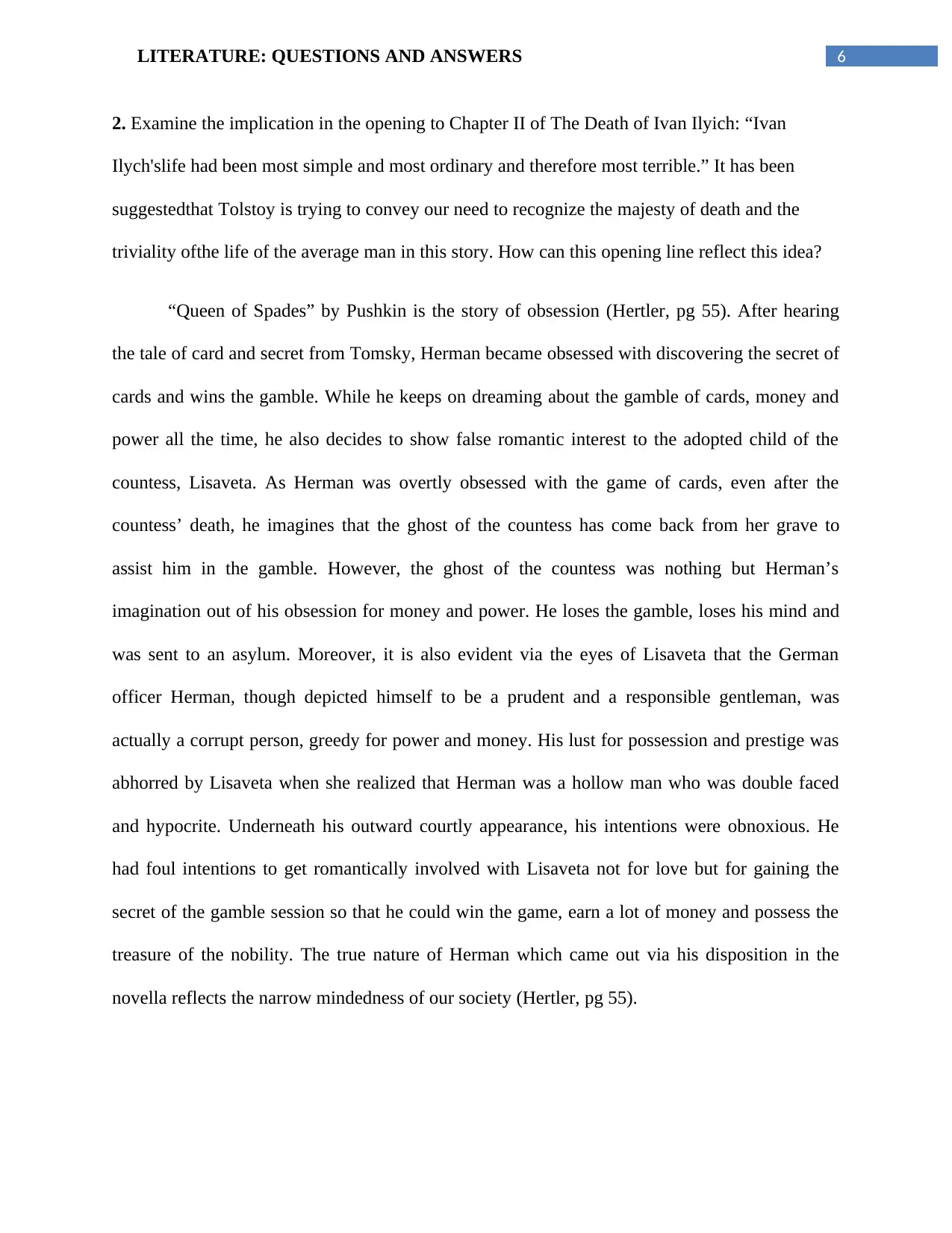
6LITERATURE: QUESTIONS AND ANSWERS
2. Examine the implication in the opening to Chapter II of The Death of Ivan Ilyich: “Ivan
Ilych'slife had been most simple and most ordinary and therefore most terrible.” It has been
suggestedthat Tolstoy is trying to convey our need to recognize the majesty of death and the
triviality ofthe life of the average man in this story. How can this opening line reflect this idea?
“Queen of Spades” by Pushkin is the story of obsession (Hertler, pg 55). After hearing
the tale of card and secret from Tomsky, Herman became obsessed with discovering the secret of
cards and wins the gamble. While he keeps on dreaming about the gamble of cards, money and
power all the time, he also decides to show false romantic interest to the adopted child of the
countess, Lisaveta. As Herman was overtly obsessed with the game of cards, even after the
countess’ death, he imagines that the ghost of the countess has come back from her grave to
assist him in the gamble. However, the ghost of the countess was nothing but Herman’s
imagination out of his obsession for money and power. He loses the gamble, loses his mind and
was sent to an asylum. Moreover, it is also evident via the eyes of Lisaveta that the German
officer Herman, though depicted himself to be a prudent and a responsible gentleman, was
actually a corrupt person, greedy for power and money. His lust for possession and prestige was
abhorred by Lisaveta when she realized that Herman was a hollow man who was double faced
and hypocrite. Underneath his outward courtly appearance, his intentions were obnoxious. He
had foul intentions to get romantically involved with Lisaveta not for love but for gaining the
secret of the gamble session so that he could win the game, earn a lot of money and possess the
treasure of the nobility. The true nature of Herman which came out via his disposition in the
novella reflects the narrow mindedness of our society (Hertler, pg 55).
2. Examine the implication in the opening to Chapter II of The Death of Ivan Ilyich: “Ivan
Ilych'slife had been most simple and most ordinary and therefore most terrible.” It has been
suggestedthat Tolstoy is trying to convey our need to recognize the majesty of death and the
triviality ofthe life of the average man in this story. How can this opening line reflect this idea?
“Queen of Spades” by Pushkin is the story of obsession (Hertler, pg 55). After hearing
the tale of card and secret from Tomsky, Herman became obsessed with discovering the secret of
cards and wins the gamble. While he keeps on dreaming about the gamble of cards, money and
power all the time, he also decides to show false romantic interest to the adopted child of the
countess, Lisaveta. As Herman was overtly obsessed with the game of cards, even after the
countess’ death, he imagines that the ghost of the countess has come back from her grave to
assist him in the gamble. However, the ghost of the countess was nothing but Herman’s
imagination out of his obsession for money and power. He loses the gamble, loses his mind and
was sent to an asylum. Moreover, it is also evident via the eyes of Lisaveta that the German
officer Herman, though depicted himself to be a prudent and a responsible gentleman, was
actually a corrupt person, greedy for power and money. His lust for possession and prestige was
abhorred by Lisaveta when she realized that Herman was a hollow man who was double faced
and hypocrite. Underneath his outward courtly appearance, his intentions were obnoxious. He
had foul intentions to get romantically involved with Lisaveta not for love but for gaining the
secret of the gamble session so that he could win the game, earn a lot of money and possess the
treasure of the nobility. The true nature of Herman which came out via his disposition in the
novella reflects the narrow mindedness of our society (Hertler, pg 55).
Paraphrase This Document
Need a fresh take? Get an instant paraphrase of this document with our AI Paraphraser
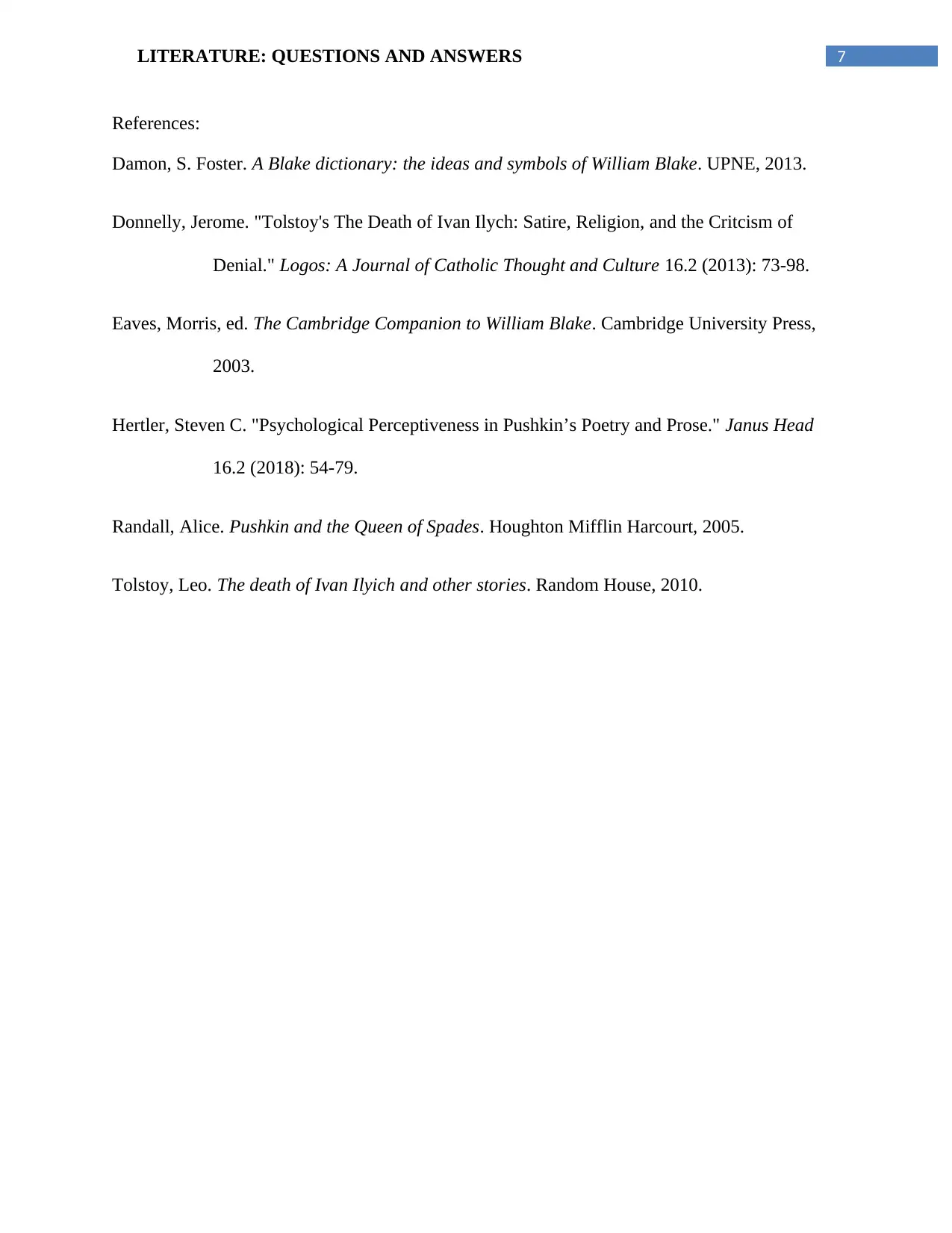
7LITERATURE: QUESTIONS AND ANSWERS
References:
Damon, S. Foster. A Blake dictionary: the ideas and symbols of William Blake. UPNE, 2013.
Donnelly, Jerome. "Tolstoy's The Death of Ivan Ilych: Satire, Religion, and the Critcism of
Denial." Logos: A Journal of Catholic Thought and Culture 16.2 (2013): 73-98.
Eaves, Morris, ed. The Cambridge Companion to William Blake. Cambridge University Press,
2003.
Hertler, Steven C. "Psychological Perceptiveness in Pushkin’s Poetry and Prose." Janus Head
16.2 (2018): 54-79.
Randall, Alice. Pushkin and the Queen of Spades. Houghton Mifflin Harcourt, 2005.
Tolstoy, Leo. The death of Ivan Ilyich and other stories. Random House, 2010.
References:
Damon, S. Foster. A Blake dictionary: the ideas and symbols of William Blake. UPNE, 2013.
Donnelly, Jerome. "Tolstoy's The Death of Ivan Ilych: Satire, Religion, and the Critcism of
Denial." Logos: A Journal of Catholic Thought and Culture 16.2 (2013): 73-98.
Eaves, Morris, ed. The Cambridge Companion to William Blake. Cambridge University Press,
2003.
Hertler, Steven C. "Psychological Perceptiveness in Pushkin’s Poetry and Prose." Janus Head
16.2 (2018): 54-79.
Randall, Alice. Pushkin and the Queen of Spades. Houghton Mifflin Harcourt, 2005.
Tolstoy, Leo. The death of Ivan Ilyich and other stories. Random House, 2010.
1 out of 8
Your All-in-One AI-Powered Toolkit for Academic Success.
+13062052269
info@desklib.com
Available 24*7 on WhatsApp / Email
![[object Object]](/_next/static/media/star-bottom.7253800d.svg)
Unlock your academic potential
Copyright © 2020–2025 A2Z Services. All Rights Reserved. Developed and managed by ZUCOL.